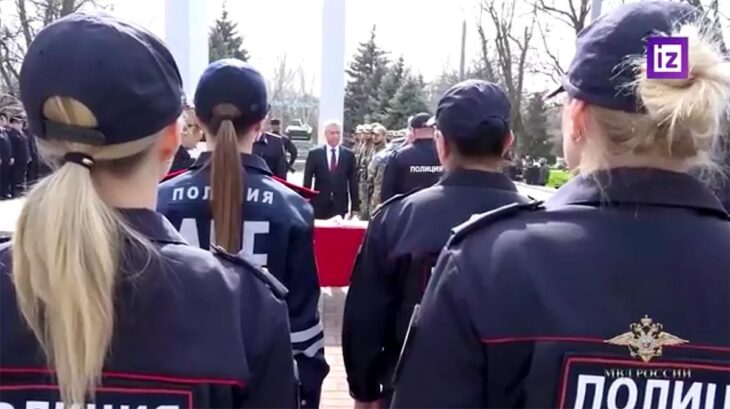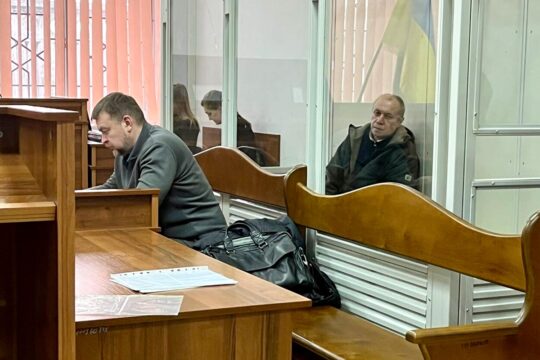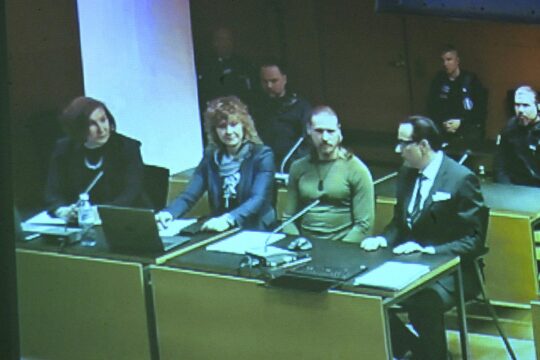On June 29, the Shevchenkivskyi Court of Kyiv, capital city of Ukraine, issued a verdict against a resident of Kherson who, according to the judgment, worked for the “Ministry of Internal Affairs of the Kherson oblast” under Russian occupation.
Not only did the woman plead guilty, but she actively assisted the investigation in exposing other collaborators. She will have to spend five years behind bars, a punishment significantly shorter than the 12 to 15 years’ term prescribed by law for collaboration. This sentence is probably the least severe for such a crime, significant of the fact that Ukrainian courts have recently started applying leniency for collaboration – upon the prosecutor's suggestion.
The accused was tried in a closed court session. Security measures were applied to her. She is also a witness in a number of similar criminal proceedings. We took advantage of this, by attending a hearing open to the public where she testified as a witness.
Anna decides to stay in Kherson
Anna [her name has been changed for security reasons] is about 30, has no children and was married. Before the occupation, she worked as a senior operative at the Information and Analytical Center of the Criminal Investigation Department at the Ministry of Internal Affairs in the Kherson oblast.
During the court hearing, Anna told the court that on February 24, 2022, the Security Service of Ukraine (SBU), police, National Guard, prosecutors and military officers left Kherson, but that some military units remained and tried to defend the Antonov Bridge to prevent the Russians from entering the city.
According to the testimony of the accused, on February 24, she arrived at her duty station in response to the national mobilization alert and followed the order of her superiors to destroy official documents. After that, the female employees were sent home and told to wait for further instructions. Later that day, she received a message that evacuation was announced in the Kherson oblast. But she also learned from her superiors that the evacuation was on a voluntary basis, so she decided to stay in Kherson, as her family did not have a car, her disabled father was undergoing treatment at the time, and her mother has a heart condition.
In early March, Kherson fell under occupation. The Russian military seized all law enforcement facilities and, having collected the employees’ data, began looking for them, believing that they would resist the new government.
On May 18, 2022, the military administration appointed General Volodymyr Lipandin as the head of the Internal Affairs in the Kherson oblast. He is the former head of the Cherkasy police, who supervised the detention of local activists during the Revolution of Dignity in 2014. Then he fled to the annexed Crimea, where he was involved in the security business.
“The FSB broke down the door”
According to Anna the occupiers would come to the houses of Ukrainian police officers with offers and afterwards with threats to force them to cooperate. The accused said she was aware that some law enforcement officers who refused to work with the occupiers were taken to torture chambers and were subjected to physical and psychological pressure.
Trapped in the city, Anna allegedly wrote reports to her superiors, asking them to assist her in leaving for the government-controlled territory of Ukraine, but the reports were ignored. The woman said she tried twice to leave the occupied city, but was denied passage at checkpoints. She and her husband were approached a number of times by representatives of the occupation authorities, who exerted psychological pressure, but she refused to cooperate. However, when they threatened her parents, she said was compelled to agree.
“Employees of the Criminal Investigation Department of the Kherson oblast Police who remained in Kherson were forcibly involved in cooperation with the Russian Federation, she testified to the court. The FSB [Federal Security Service of the Russian Federation] came to them and to me, broke down the door... Yes, it was coercive. I went to work because my parents were threatened. In addition, there were no financial means to live. Russian food and medicine were imported. My parents are disabled. I'm sorry, as a decent daughter I went breaking the law... I managed to extract my father, who was treated and is now abroad, he left... I was saving money and waiting for Kherson to be de-occupied."
“Basically, there was no legislation”
From June 23 to June 30, 2022, Anna held the position of "acting inspector of the personnel support unit of the forensic centre" at the Ministry of Internal Affairs in Kherson oblast, and from June 30 to July 19, 2022, she was "acting head of the personnel support unit of the forensic centre". On July 19, 2022, the woman claims, she was transferred against her will to the Main Department of the Ministry of Internal Affairs of Kherson oblast under the occupation authorities to the position of “Acting Deputy Head of the Department of Human Resources”.
In her last position, she reviewed orders on employment, dismissal and transfer of occupation police officers, dealt with statistical data and reported to the senior management on personnel assignments. Recruitment was offered for those who had not worked in the police before, and people came to the district offices and filed applications for employment.
“I did not see them coming. I cannot say if this or that person was brought by force and coerced to write an application. It was not within my duties. I was not involved in it. I can say that there were people who voluntarily came to the forensic center and applied for employment. When I joined the main department, more than 500 people were appointed, and when I left, there were about 1,200 people who were working, and 80-90 had already resigned on their own request".
On August 29, 2022, General Lipandin signed an order approving the staffing structure of the Main Department of the Ministry of Internal Affairs in the Kherson oblast and an order to establish district departments – the total number of employees was to be 6,500. However, in reality, according to the witness, there were about a thousand people working at that time.
According to the woman, it was possible to resign only with the consent of the supervisor; if the supervisor did not sign the resignation letter, nobody took it into consideration. The woman said that sometimes orders of appointment were issued to people who did not know they were employed and did not come to work. During her interrogation in court, she recalled two such cases.
Russian legislation was to enter into full force after the referendum. Until then, "basically, there was no legislation. The representatives sent to us from the Russian Federation wanted us to work under Russian law. Investigative departments operated under Russian law because they were opening cases under articles of the Russian Criminal Code. We, as a personnel unit, did not use the federal law at human resources", she stated.
Anna resigns and copies data for Ukrainian services
On September 12, 2022, Anna resigned on her own request, she says, because she “did not agree with the current legislation and the fact that they wanted to organize a referendum in Kherson. I did not support the government and the fact that Kherson was occupied. Therefore, I decided to resign (...) When I resigned, I downloaded all the official information related to the personnel department to my flash drive: orders, charts, tables. I saved all the information and handed it over to the Security Service of Ukraine".
On September 30, the Russian Federation claimed to have annexed Kherson Oblast. But on November 9, Russian forces withdrew from the city and were regrouped on the eastern side of the Dnieper river. On November 11, Ukraine announced that its forces had entered the city, following the Russian withdrawal.
It was Anna’s own decision to approach the Ukrainian police. And they did not refuse to help, but suggested that these documents be seized during a search of her home. That same evening, during the search, the woman voluntarily handed over her work laptop, flash drive, and cell phone. On November 30, 2022, she was officially arrested.
The flash drive contained documents on the employment of police officers, tables with lists of employees. Now, during the trials of the collaborators, Anna explains the origin of these documents. For instance, a few weeks before the verdict, she testified in court about one such occupation police officer whose assignment order was on the flash drive. Anna did not know the accused, and they only met after their arrest, when they were both escorted to extend the pre-trial investigation.
The court takes mitigating circumstances into account
Anna asked the court to take into account that, risking her own life, she had gathered and passed on to the Ukrainian special services all possible official information about more than 1,000 people who had collaborated with the occupation authorities in Kherson.
The court took into account the woman's confession, her sincere remorse, active assistance to the investigation of the crime, the fact that she committed the crime due to a concurrence of difficult personal circumstances, and her negative and critical attitude towards the crime. Therefore, the court agreed to a sentence lower than the lowest limit prescribed by law.
Anna was sentenced to five years in prison with a 10-year ban on holding positions in law enforcement, without confiscation of property. So far, she has already served more than six months of her prison term in pre-trial detention.
This report is part of our coverage of war crimes justice produced in partnership with Ukrainian journalists. A first version of this article was published on the "Sudovyi Reporter" website.








